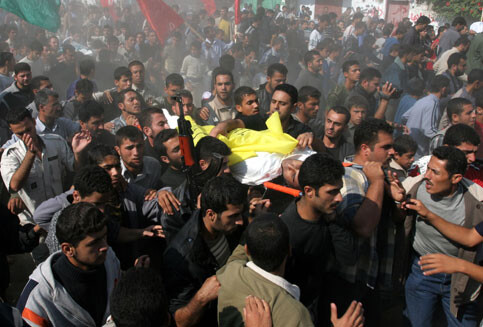United Nations News Service 8 November 2006

Palestinians mourn during the funerals of 20 Palestinians who were buried in Beit Hanoun in the northern Gaza Strip, November 7, 2006. (MaanImages/Wesam Saleh)
8 November 2006 - United Nations officials voiced shock and dismay at Israel’s shelling of a residential area in the occupied Gaza Strip in which 18 Palestinian civilians were killed, including eight children and seven women, with Secretary-General Kofi Annan calling on the Israeli Government to cease its military operations there forthwith.
In a statement issued by his spokesman, Mr. Annan took note of the reported announcement by Israel of a full investigation and said he looked forward to its early results. He also called on the Palestinians to halt attacks against Israeli targets.
The Security Council President for November, Ambassador Jorge Voto-Bernales of Peru, summoned the 15-member body for urgent consultations on the situation, including today’s shelling of the residential area in Beit Hanoun.
“Only last Friday, the Secretary-General expressed his deep concern about the rising death toll caused by the Israeli military operation in northern Gaza, given that such operations inevitably cause civilian casualties,” Mr. Annan’s spokesman said. “The Secretary-General reminds both sides of their obligations under international humanitarian law regarding the protection of civilians in armed conflict.”
UN Special Coordinator for the Middle East Peace Process Alvaro de Soto said he was “deeply shocked and appalled” by the shelling.
“The UN Special Coordinator cannot but express his condemnation and call upon the Israeli Government to call off these and other military operations with delay,” he said in a statement, also calling on the Palestinian side to cease attacks against Israeli targets.
“This morning’s tragedy is yet more evidence, if any were needed, of the necessity to end this futile and provocative cycle of violence,” the head of the UN Relief and Works Agency (UNRWA) which cares for Palestinian refugees, Karen AbuZayd, said in a statement.
Noting that only yesterday she visited Beit Hanoun shortly after Israeli forces left the area following a six-day occupation and saw “first hand the despair of people trying to come to terms with death and destruction on a scale not seen in Gaza for many years,” she too voiced “shock and dismay at the killing of yet more Palestine refugees.”
In a related development an independent UN human rights expert today called on the Security Council to take “urgent action” on what he called Israel’s “brutal collective punishment of a people” in Gaza.
“The Quartet, comprising the United Nations, the European Union, the United States and the Russian Federation, has done little to halt Israel’s attacks,” John Dugard, Special Rapporteur on the situation of human rights in the Palestinian territories occupied since 1967, said in a statement today.
“Worse still, the Security Council has failed to adopt any resolution on the subject or attempt to restore peace to the region. The time has come for urgent action on the part of the Security Council. Failure to act at this time will seriously damage the reputation of the Security Council,” he added.
Special Rapporteurs are unpaid independent advisory experts with a mandate from the Geneva-based UN Human Rights Council. The Quartet has promoted the so-called Road Map peace plan which calls for Israelis and Palestinians to live side-by-side in two States, originally by the end of last year.
“On 25 June 2006 Israel embarked on a military operation in Gaza that has resulted in over 300 deaths, including many civilians; over 1,000 injuries; large-scale devastation of public facilities and private homes; the destruction of agricultural lands; the disruption of hospitals, clinics and schools; the denial of access to adequate electricity, water and food; and the occupation and imprisonment of the people of Gaza,” Mr. Dugard said.
“This brutal collective punishment of a people, not a government, has passed largely unnoticed by the international community,” he added.
Related Links